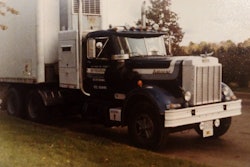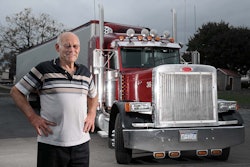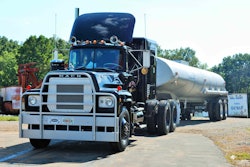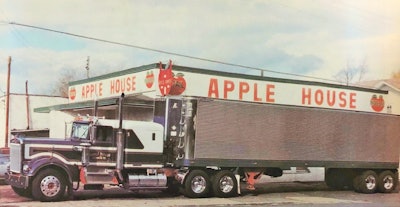 Overdrive‘s “Tractor of the Month” for the March 1979 issue was this ’79 KW and reefer trailer of Eddie Karwaski’s Scranton, Pa.-area-based Apple House Trucking.
Overdrive‘s “Tractor of the Month” for the March 1979 issue was this ’79 KW and reefer trailer of Eddie Karwaski’s Scranton, Pa.-area-based Apple House Trucking.Former Apple House Trucking owner Eddie Karwaski started the business in 1963, buying a house at 3726 Birney Ave. in Moosic, Pa., from a man named Patty McAndrew, who had a wholesale produce stand on Lackawanna Ave. in Scranton. Hence, says Karwaski’s daughter, Maureen Rebar, the “apple house” name. Also, Karwaski ” added a garage onto it and originally packed apples and watermelons” as the principal business, which then grew into “hauling watermelons and other produce out of the South, primarily Florida.”
Rebar says she and her siblings — two brothers who were part of the trucking business in later years — imagined their father “would be sitting in the office in his chair at 82 years old still bossing people around.” As it turned out, however, Karwaski passed at 82 a year ago Tuesday this week, Feb. 26. I spoke with Rebar on the anniversary about her father, as she worked on amassing a collection of memorabilia of his decades in business hauling produce, including two spotlights in 1979 and 1981 issues of Overdrive.
The first, a Tractor of the Month profile, included the picture above of the original office location. The building was lost around the same time in a fire, as Rebar and the story itself note:
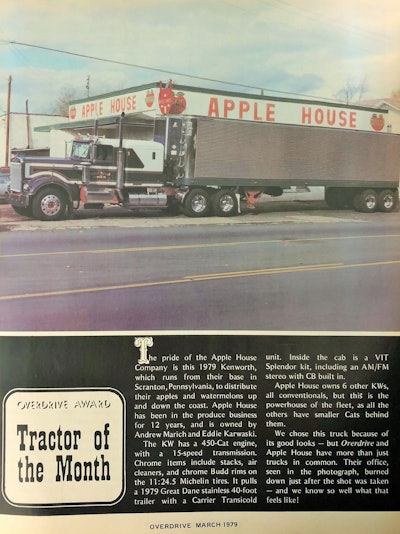
Rebar’s memory of her father’s time at the reins of the trucking business are of a man fully in control. “If you knew my dad, it was his say or no say,” she says. “He ran the business,” though with a partner who owned a small stake in it, “and he was the boss.”

He had his soft sides, too, Rebar notes. “He was very generous to the local Moosic community and he attended Catholic mass seven days a week.”
Generous to his company’s drivers, too, according to trucker Beth Howells, who along with her husband trucked for Karwaski and Apple House for many years. She calls him one heck of a boss, generous with his success to those who helped attain it. Karwaski “took tons of us to opening day at Daytona every year, paid for meals and motels” — and seats. “Good ones, too.”
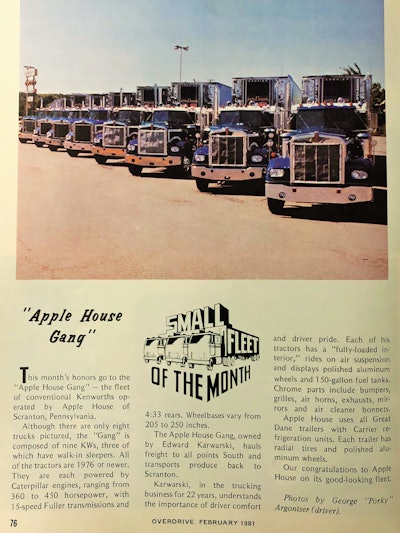 Howells notes she and her husband were part of the “gang” for years — the “left lane gang,” she clarifies. Howells’ husband also attended other races with Karwaski over the years.
Howells notes she and her husband were part of the “gang” for years — the “left lane gang,” she clarifies. Howells’ husband also attended other races with Karwaski over the years.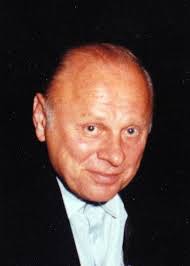 Edward “Whitey” Karwaski passed Feb. 26, 2018, at the age of 82. His obituary, written by daughter Maureen Rebar, can be found at this link.
Edward “Whitey” Karwaski passed Feb. 26, 2018, at the age of 82. His obituary, written by daughter Maureen Rebar, can be found at this link.Maureen’s husband, Vince, also worked for Apple House, doing anything from unloading trucks to running the safety department as the fleet grew. Vince worked for Karwaski for 18 years and says he “was the best boss I ever had.”
Apple House at its height in the early 1990s ran 52 trucks, according to Maureen Rebar’s brother Brian Karwaski. “They covered Pennsylvania, California, the Pacific Northwest and British Columbia in Canada hauling produce and other freight,” Rebar says. “The fleet was about 30 Kenworth W900s, T600s, and T300s with a mix of aerodynamic and flat tops.” Around 20 Freightliner FLDs and mostly Great Dane reefers with Carrier and Thermo King reefer units rounded out the fleet.
Caterpillars for the engines, always.
Distinctive blue, gold and white paint colors and striping design on the trucks was “created by Jackie Urban, a relative of my father’s,” says Rebar, patented “so no other companies could use it. The logos on the trailers with the red apple was designed by Eddie Jr.,” Rebar’s other brother.
The company closed as the recession took hold in 2007, and as Karwaski began dealing with health issues. He was later diagnosed with Parkinson’s and associated dementia, and his wife, along with Rebar, cared for him with help from many others through the remainder of his time, including two years at a nursing home near to where the family lived.
Today, Rebar’s a social worker by profession herself, and is working on a book about her father and the long care-giving experience.
And, as do so many others no doubt, she certainly misses her dad.

